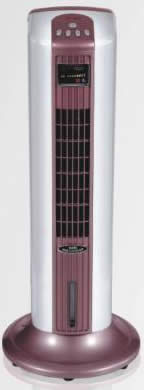Difference between Cooler and Air Conditioner
Key Difference: Coolers uses the hot air in the room and water in order to produce cooler air. It puts the hot air through wet absorptive wet pads in order to add water to the air and produces cooler air. On the other hand, air conditioners use refrigerants and a much more complex process in order to cool the temperature. In addition to cooling the air, air conditions can also heat the air in cold weather and also function as a dehumidifier.
Coolers and Air Conditioners are two types of appliances that a person can use in order to make the air cooler. Though electrical fan it the most economical, in high temperatures it does not cool efficiently. These two machines are completely different from each other, though they share the fact that both can produce cool air. An air conditioner goes a step further and even produces heat, in addition to cool air. Let’s look at both of these machines separately.
 A cooler, also known as, evaporative cooler, swamp cooler, desert cooler and wet air cooler, uses the hot air in the room and water in order to produce cooler air. It uses the evaporating technique in order to produce the cool air, earning the name evaporative cooler. Evaporative cooling employs water's enthalpy of vaporization, where the temperature of dry air can be dropped by putting it through transition of liquid water to water vapor. The system uses water in to wet absorptive on the sides of the cooler. A fan is used to send the water through the absorptive pads which cools the air by making it more humid and then blows it out to the room. A cooler uses less energy as it only has two major components which need powering; a water pump and a fan. It also needs a constant supply of water; between 3-10 gallons of water in order to keep the pads wet and cool the air.
A cooler, also known as, evaporative cooler, swamp cooler, desert cooler and wet air cooler, uses the hot air in the room and water in order to produce cooler air. It uses the evaporating technique in order to produce the cool air, earning the name evaporative cooler. Evaporative cooling employs water's enthalpy of vaporization, where the temperature of dry air can be dropped by putting it through transition of liquid water to water vapor. The system uses water in to wet absorptive on the sides of the cooler. A fan is used to send the water through the absorptive pads which cools the air by making it more humid and then blows it out to the room. A cooler uses less energy as it only has two major components which need powering; a water pump and a fan. It also needs a constant supply of water; between 3-10 gallons of water in order to keep the pads wet and cool the air.
Coolers work best in places with dry heat, where humidity in the air is welcome. In places where humidity is high, coolers are ineffective and do not cool air properly. A cooler must also exhaust as much air as it intakes and hence requires an open window. If it continues to circulate the same air, humidity in the room increases and temperature of the air blown from the cooler also rises. Coolers are inexpensive compared to other cooling devices and have a much cheaper maintenance due to cheap parts. They are also easier and cheaper to install and can also be installed without professional help. Coolers can also use a duct system to control the air flow, though these are only common in big coolers that are used to cool large refrigerating systems. Coolers are also limited in terms of temperature and can only reduce the temperature by a few degrees below the ambient temperature.

Compared to coolers, an air conditioner or AC uses refrigerants in order to cool the temperature. ACs can also reduce the humidity of the air in the area. The term air conditioning means altering the properties of air, temperature and humidity, to more favorable conditions. The term can also refer to any form of technological cooling, heating, ventilation, or disinfection that modifies the condition of air. Air conditioners can work no matter where you reside or whatever the humidity level. The cooling is typically done using a simple refrigeration cycle, but sometimes evaporation can also be used. The first modern air conditioner was invented by Willis Haviland Carrier in 1911. By 1920s, ACs had become popular among households.
The air conditioner cools the air using coils, which are filled with refrigerants, which have the ability to change state at relatively low temperatures. Air conditioners also have airs and ducts in order to transport air from one place to another in the system. Hot air is sent over the low-pressure refrigerant-filled evaporator coils, which then absorb heat and changes from liquid state to gaseous state and is then converted back to liquid state when the gas is compressed. The extra heat that is produced from compressing the gas is then evacuated through the back, while the cool air is sent into the room. This process is continued over and over again to keep the cooling process. An AC has four major parts; evaporator, condenser, expansion valve, and compressor.
Though similar to air coolers, ACs can make the room cooler; they are much powerful compared to coolers and can make the temperature fall below what coolers can offer. ACs also have features such as thermostat to monitor how cool the air is, filters to remove particulates in the air, and also function has dehumidifiers. Air conditioners are expensive and require assistance in order to set up, though portable ACs can be set up without professional help.
In comparison coolers are not as strong compared to air conditioners, are much cheaper and save a lot on energy, which is not possible in case of ACs. They also do not require professional help, unlike ACs. Coolers are also more environment friendly compared to air conditioners, which release ozone depleting chemicals into the atmosphere, though much more environmental friendly ACs are available with today’s advanced technology. Air conditions keep odors, insects and other pollution at bay and can also provide purified air, which a cooler cannot do.
Depending on one’s preference and budget a person should opt to buy either a cooler or an air conditioner. They should, however, keep in mind certain points like humidity level, space constraint, environmental conditions and other factors when purchasing a machine.
|
|
Cooler |
Air Conditioner |
|
Definition |
A cooler cools the air by evaporating the air. |
An air conditioner is system designed to change the air temperature and humidity within an area. It can either be cold or hot |
|
Other names |
Evaporative cooler, swamp cooler, desert cooler and wet air cooler |
AC |
|
Process |
The air is pulled through the back of the unit and processed through wet absorptive pads and cooled |
Warm air is run over refrigerant-filled coils, which absorbs heat and changes it from liquid to a gaseous state. The air is then converted back to liquid state and evacuated outside. |
|
Energy-efficient |
More efficient compared to AC |
Less efficient compared to coolers |
|
Maintenance |
Is not costly |
Is costly |
|
Cost |
Cost less to purchase the unit |
Costs more to purchase the unit |
|
Environment Friendly |
More environmental friendly |
Less environmental friendly |
|
Portability |
Is more portable compared to AC |
Once fixed it is not portable, though new portable ACs are available |
|
Advantages |
Less expensive to install, Less expensive to operate, Ease of maintenance, air is fresher |
Works in all seasons, can heat as well as cool, can have purification benefits, cooling can be controlled, keeps out insects, reduces humidity |
|
Disadvantages |
Humidity lowers cooling capability, air supplied by cooler is humid, requires a constant supply of water for pads, needs constant cleaning, can attract mosquitoes |
Less environmental friendly, more expensive to maintain, expensive to purchase, air is stale, uses 4x the energy of coolers, continuous reduced humidity can cause respiratory problems |
Image Courtesy: made-in-china.com, ahi-toshiba.com









Comments
Dr. Almas
Fri, 03/17/2017 - 18:30
neetaj sahni
Fri, 09/18/2015 - 21:22
Nice comparison. Thank for the information
Ituen
Sun, 02/08/2015 - 01:16
I recommend use both the machines at the same time.e.g..
Start an ac for two hours and then run cooler for the complete night.
varun
Wed, 05/07/2014 - 11:30
useful information for me,thank u
abdul khareem
Tue, 04/29/2014 - 14:16
In a very hot place suddenly coming out of an air conditioned room may cause a sun stroke. So in such places use of air coolers is recommended.
s.p. lele
Mon, 04/07/2014 - 11:43
Add new comment